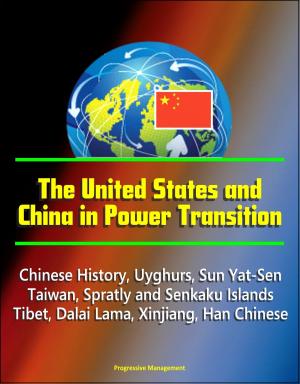2014 Ukraine and Crimea Crisis: The Crimean Tatars and Their Influence on the Triangle Of Conflict - Russia - Crimea - Ukraine, History of Crimea, Sevastopol, Russian Black Sea Fleet
Nonfiction, History, Asian, Former Soviet Republics, Eastern Europe| Author: | Progressive Management | ISBN: | 9781310219511 |
| Publisher: | Progressive Management | Publication: | February 28, 2014 |
| Imprint: | Smashwords Edition | Language: | English |
| Author: | Progressive Management |
| ISBN: | 9781310219511 |
| Publisher: | Progressive Management |
| Publication: | February 28, 2014 |
| Imprint: | Smashwords Edition |
| Language: | English |
This study of the conflict over the years involving Ukraine, Russia, and the Crimea is particularly interesting and relevant in light of the ongoing crisis in 2014. The dissolution of the Soviet Union brought about multidimensional problems to the former republics of the USSR and their inhabitants. In 1990s Ukraine, Crimea became a center of conflict between Ukraine and Russia over the former Soviet Black Sea Fleet and Crimea itself, perceived as historically their own by both sides of the conflict. Local Crimean authorities took advantage of the specificity of a demographic situation in Crimea were Ukrainians, the titular nation, are in minority and considerably Russified to claim for autonomy. Later, they attempted to secede from Ukraine. At the same time, the Crimean Tatar influx from exile, orchestrated by the Stalin regime in 1944, further exacerbated the 'triangle of conflict' between the dyads Russia-Ukraine and Crimea-Ukraine. The Crimean Tatars, currently 12 percent of the Crimean population, proclaimed Crimea the national territory of the Crimean Tatar people, on which they alone possess the right to self-government and claimed greater rights for themselves as allegedly the most indigenous peoples in Crimea, while the rest are colonizers. The explains the historical developments in Crimea and attempts to draw implications to the Ukrainian government in dealing with Crimean Tatar nationalism which seems to be overcoming the problems within the 'triangle of conflict' that was so sharp in 1990s.
Introduction * Purpose * Importance * Literature Review * Survey of Prior Work On The Question * Major Questions And Debate * Methodology And Sources * Synopsis * Brief History of Crimea * Crimea And Contiguous Areas In Early History * Prehistoric Times * Crimea And Kievan Rus' * The Mongols, Golden Horde And Crimea * The Khanate of Crimea * Crimea Under Russia's Rule * Crimea In The Twentieth Century * Crimea After The 1917 Revolution And During The Civil War * Crimea In The Soviet Union * Crimea As Part of Independent Ukraine * Conclusion * Crimea's Importance To Security In The Black Sea Region * Symbolic And Strategic Importance of Crimea For Russia And Ukraine * Importance of Crimea To Turkey * Importance of Crimea To Russia * Ethnic Importance of Crimea * Military Importance of Crimea * Historic And Symbolic Importance of Crimea * Economic Importance of Crimea * Importance of Crimea To Ukraine * Political Importance of Crimea * Economic Importance of Crimea * Strategic Importance of Crimea * Ukraine's Policy In Crimea Since 1991 * Developments In Ukraine - Crimea Context Before 2004 * Developments In Ukraine-Crimea Relations Since 2004 * Conclusions * Crimean Tatars And The Influence of Other Nations On Their Development As A Nation * Contested Ethnogenesis of The Crimean Tatars * The Ethnogenesis * Thoughts On The Proposed Crimean Tatar Ethnogenesis And Claims Based Upon It * Causes of Demographic Changes In Crimea * Changes In Crimean Demographics Under The Russian Empire * Revival of The Crimean Tatar Identity And Demographics * Changes In Crimean Demographics Under The Soviet Union * Surgun And The Return From Exile: Challenges And Consequences * Why The Crimean Tatars Were Resettled * Surgun * The Struggle For Return * Challenges And Consequences * The Russian Black Sea Fleet In Ukraine * A History of A Conflict Over The Black Sea Fleet * Soviet Black Sea Fleet * Russian And Ukrainian Perception of The Black Sea Fleet * Background For The Dispute of Black Sea Fleet Accords * Black Sea Fleet Accords * Current Disputes Between Ukraine And Russia Over The Bsf * The RBSF In Crimea: Real And Imaginable Roles * The Negative Role of The RBSF In Crimea * Positive Roles of The RBSF In Crimea And Implications Derived From These Roles * Conclusion * Ethnic Imbroglio In Crimea: A Problem Through The Prism of The Theory of Autonomy
This study of the conflict over the years involving Ukraine, Russia, and the Crimea is particularly interesting and relevant in light of the ongoing crisis in 2014. The dissolution of the Soviet Union brought about multidimensional problems to the former republics of the USSR and their inhabitants. In 1990s Ukraine, Crimea became a center of conflict between Ukraine and Russia over the former Soviet Black Sea Fleet and Crimea itself, perceived as historically their own by both sides of the conflict. Local Crimean authorities took advantage of the specificity of a demographic situation in Crimea were Ukrainians, the titular nation, are in minority and considerably Russified to claim for autonomy. Later, they attempted to secede from Ukraine. At the same time, the Crimean Tatar influx from exile, orchestrated by the Stalin regime in 1944, further exacerbated the 'triangle of conflict' between the dyads Russia-Ukraine and Crimea-Ukraine. The Crimean Tatars, currently 12 percent of the Crimean population, proclaimed Crimea the national territory of the Crimean Tatar people, on which they alone possess the right to self-government and claimed greater rights for themselves as allegedly the most indigenous peoples in Crimea, while the rest are colonizers. The explains the historical developments in Crimea and attempts to draw implications to the Ukrainian government in dealing with Crimean Tatar nationalism which seems to be overcoming the problems within the 'triangle of conflict' that was so sharp in 1990s.
Introduction * Purpose * Importance * Literature Review * Survey of Prior Work On The Question * Major Questions And Debate * Methodology And Sources * Synopsis * Brief History of Crimea * Crimea And Contiguous Areas In Early History * Prehistoric Times * Crimea And Kievan Rus' * The Mongols, Golden Horde And Crimea * The Khanate of Crimea * Crimea Under Russia's Rule * Crimea In The Twentieth Century * Crimea After The 1917 Revolution And During The Civil War * Crimea In The Soviet Union * Crimea As Part of Independent Ukraine * Conclusion * Crimea's Importance To Security In The Black Sea Region * Symbolic And Strategic Importance of Crimea For Russia And Ukraine * Importance of Crimea To Turkey * Importance of Crimea To Russia * Ethnic Importance of Crimea * Military Importance of Crimea * Historic And Symbolic Importance of Crimea * Economic Importance of Crimea * Importance of Crimea To Ukraine * Political Importance of Crimea * Economic Importance of Crimea * Strategic Importance of Crimea * Ukraine's Policy In Crimea Since 1991 * Developments In Ukraine - Crimea Context Before 2004 * Developments In Ukraine-Crimea Relations Since 2004 * Conclusions * Crimean Tatars And The Influence of Other Nations On Their Development As A Nation * Contested Ethnogenesis of The Crimean Tatars * The Ethnogenesis * Thoughts On The Proposed Crimean Tatar Ethnogenesis And Claims Based Upon It * Causes of Demographic Changes In Crimea * Changes In Crimean Demographics Under The Russian Empire * Revival of The Crimean Tatar Identity And Demographics * Changes In Crimean Demographics Under The Soviet Union * Surgun And The Return From Exile: Challenges And Consequences * Why The Crimean Tatars Were Resettled * Surgun * The Struggle For Return * Challenges And Consequences * The Russian Black Sea Fleet In Ukraine * A History of A Conflict Over The Black Sea Fleet * Soviet Black Sea Fleet * Russian And Ukrainian Perception of The Black Sea Fleet * Background For The Dispute of Black Sea Fleet Accords * Black Sea Fleet Accords * Current Disputes Between Ukraine And Russia Over The Bsf * The RBSF In Crimea: Real And Imaginable Roles * The Negative Role of The RBSF In Crimea * Positive Roles of The RBSF In Crimea And Implications Derived From These Roles * Conclusion * Ethnic Imbroglio In Crimea: A Problem Through The Prism of The Theory of Autonomy















